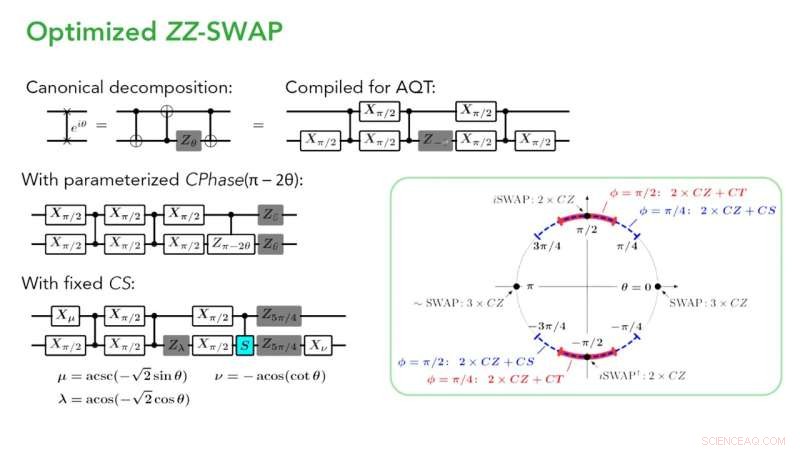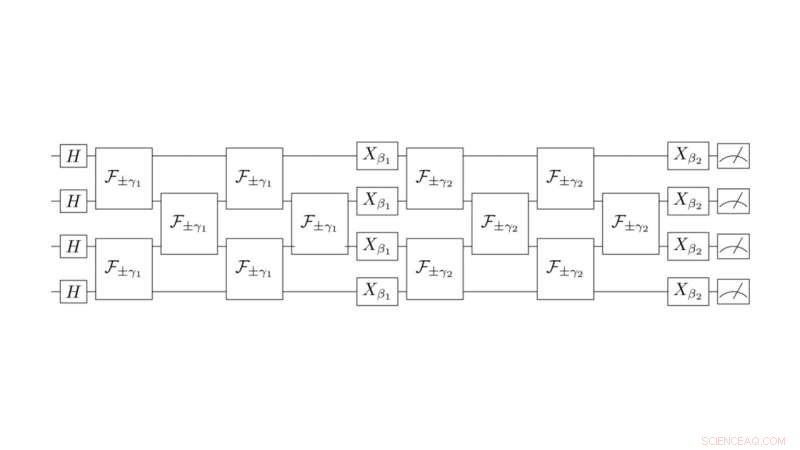
Omfattande schema över mjukvaruoptimerade SWAP-nätverk för AQT:s grindar. Kredit:Rich Rines/Super.tech
Ett forskningssamarbete vid Advanced Quantum Testbed (AQT) vid Lawrence Berkeley National Laboratory (Berkeley Lab) och Chicago-baserade Super.tech (förvärvade av ColdQuanta i maj 2022) visade hur man optimerar exekveringen av ZZ SWAP-nätverksprotokollet, viktigt för att kvantberäkning. Teamet introducerade också en ny teknik för att lindra kvantfel som kommer att förbättra nätverksprotokollets implementering i kvantprocessorer. Experimentdata publicerades i juli i Physical Review Research , lägga till fler vägar på kort sikt för att implementera kvantalgoritmer med hjälp av grindbaserad kvantberäkning.
En smart kompilator för supraledande kvanthårdvara
Kvantprocessorer med två- eller tredimensionella arkitekturer har begränsad qubit-anslutning där varje qubit interagerar med endast ett begränsat antal andra qubits. Dessutom kan varje qubits information bara existera så länge innan brus och fel orsakar dekoherens, vilket begränsar körtiden och tillförlitligheten för kvantalgoritmer. Därför måste forskare, när de designar och exekverar en kvantkrets, optimera översättningen av kretsen som består av abstrakta (logiska) grindar till fysiska instruktioner baserade på de inbyggda hårdvarugrindar som finns tillgängliga i en given kvantprocessor. Effektiva kretsnedbrytningar minimerar driftstiden eftersom de tar hänsyn till antalet grindar och operationer som stöds av hårdvaran för att utföra de önskade logiska operationerna.
SWAP-grindar – som växlar information mellan qubits – introduceras ofta i kvantkretsar för att underlätta interaktioner mellan information i icke-angränsande qubits. Om en kvantenhet endast tillåter grindar mellan intilliggande qubits, används swappar för att flytta information från en qubit till en annan icke-angränsande qubit.
I bullriga intermediate-scale quantum (NISQ) hårdvara, kan införandet av swap-gates kräva en stor experimentell overhead. Växlingsgrinden måste ofta sönderdelas till inhemska grindar, såsom styrda-NOT-grindar. Därför, när man designar kvantkretsar med begränsad qubit-anslutning, är det viktigt att använda en smart kompilator som kan söka efter, bryta ner och avbryta redundanta kvantgrindar för att förbättra körtiden för en kvantalgoritm eller applikation.

Schematisk över SWAP-nätverk för QAOA på fyra qubits. Kredit:Akel Hashim/Berkeley Lab
Forskningspartnerskapet använde Super.techs SuperstaQ-mjukvara som gjorde det möjligt för forskare att finskräddarsy sina applikationer och automatisera sammanställningar av kretsar för AQT:s supraledande hårdvara, särskilt för en inbyggd high-fidelity-styrd-S-grind, som inte är tillgänglig på de flesta hårdvarusystem. Denna smarta kompileringsmetod med fyra transmon-qubits gör att SWAP-nätverken kan dekomponeras mer effektivt än vanliga nedbrytningsmetoder.
A network of ZZ SWAP gates requires only minimal linear connectivity between qubits without additional couplings, so it offers practical advantages for the efficient execution of quantum algorithms such as the Quantum Approximate Optimization Algorithm (QAOA). QAOA approximates solutions to combinatorial optimization problems—finding the optimal answer by giving a set of criteria. The Maximum-Cut problem, which can be used to arrange hubs on a transport grid system, is an example of a famous combinatorial optimization problem that can be potentially solved faster with QAOA using quantum circuits.
"One of the toughest challenges in quantum computing is to perform discrete logic operations. Because our control signals are analog and continuous, they're always imperfect. As we build more complex quantum circuits, the software infrastructure that optimally compiles gates tailored for AQT's hardware helps us achieve higher operational fidelity," Akel Hashim, the lead AQT researcher on the experiment and a graduate student at the University of California, Berkeley.
"A unique feature of quantum computing is that it enables partial logic gates. This feature has no parallel in traditional boolean logic—for example, your laptop computer can't execute 50% of an AND gate. AQT's ability to calibrate these partial controlled-S quantum gates opened the door for us to develop a wider array of novel optimizations to squeeze the most out of the hardware," said Rich Rines, formerly of Super.tech and currently a software engineer at ColdQuanta.
"A key software engineering challenge for this experiment was collaborating remotely, so we iteratively developed quantum circuit optimizations informed by the custom gates AQT's team calibrated. We optimized end-to-end by figuring out how to serialize these pulses while considering the hardware. We also figured out how to integrate open-source quantum software packages with our compiler, ensuring that our optimizations don't re-invent the wheel," said Victory Omole, formerly at Super.tech and software engineer at ColdQuanta.

Akel Hashim, lead AQT researcher on the experiment. Credit:Akel Hashim/Berkeley Lab
As part of the experiment, the team also introduced a novel technique called Equivalent Circuit Averaging (ECA), which randomized the various parameters of the SWAP networks to generate many logically equivalent circuits. ECA randomizes the decomposition of quantum circuits, mitigating the impact of systematic coherent errors—one of the most severe errors in quantum computers and error mitigation at AQT.
"I proposed a way to merge my previous experimental work in randomized compiling with Quantum Benchmark (acquired by Keysight) using Super.tech's smart compiler to study a new way to reduce the impact of crosstalk errors," said Hashim. "I would not have had the insight to come up with this idea had I not worked with other researchers as part of AQT's user program. As someone who's going to enter the workforce, networking is critical to building a core base of people I know in the field who are experts in various areas, to whom I can pitch research ideas as well."
These experimental optimizations resulted in an improvement of up to 88% in the performance accuracy of QAOA. Researchers are looking to continue to explore and refine the methods in this work and apply them to other applications.
Supporting industry growth with an open-access research lab
AQT operates a state-of-the-art open experimental testbed based on superconducting circuits and is funded by the United States Department of Energy Office of Science Advanced Scientific Computing Research (ASCR) program. Technologies developed elsewhere can be deployed and field-tested at AQT, providing deep access to the full quantum computing stack at no additional cost.
Since the inauguration of its user program in 2020, AQT provided Super.tech, one of several industry users, with low-level access to the hardware to test their ideas. Few cloud-based quantum platforms offer this type of full access to the entire quantum computing stack and real-time feedback from the hardware experts at no cost. Super.tech collaborated with AQT's expert experimental team to learn ways to improve performance on this type of hardware.
"By revealing the inner controls of quantum hardware, AQT's collaborative approach with users drives innovation throughout the quantum computing stack. We look forward to continuing our research collaboration with AQT, and we will continue to share these results with the scientific community by publishing our learnings," said Pranav Gokhale, VP of Quantum Software at ColdQuanta and Super.tech former CEO and co-founder.
AQT at Berkeley Lab continues to grow as a cutting-edge hub for quantum information research and development by bringing together expertise and users, including early-stage startups, such as Super.tech, who now continue in their growth journey as part of ColdQuanta. + Utforska vidare